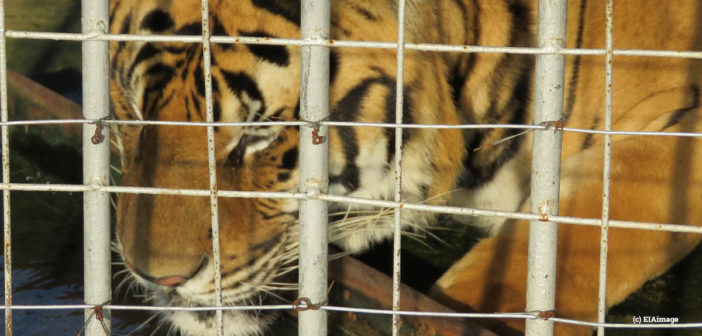On October 29th, the Government of China revealed that it allows commercial trade in tiger bone and rhino horn from farmed animals for use in traditional Chinese medicine research and clinical treatments. This is a brazen and regressive position which drastically undermines international efforts for tiger and rhino conservation.
In taking this position, China has revealed its true priorities. Instead of protecting tigers and rhinos by working towards ending the vast demand in the country for their parts and products, the Chinese government is evidently far more interested in stimulating and appeasing its traditional medicine and burgeoning tiger farming industries.

A man sells goods on the street in China, including some animal parts used in Chinese medicine. Photo credit Bari Bookout, CC BY-SA 3.0.
Debbie Banks, Environmental Investigation Agency (EIA) Tiger Campaign Leader, said, “At a single stroke, China has shattered its reputation as a growing leader in conservation following its domestic ban on the sale of ivory at the start of the year.
“It is instead revealed as a sham, its international image in tatters and its credibility destroyed – and all for the sake of deeply questionable business sectors which serve only to drive consumer demand for the parts and products of endangered species.

Various traditional medicine products and items from endangered species including tigers, Asiatic moon bears, and rhinoceros. Image credit International Fund for Animal Welfare, CC BY-SA 3.0.
“History will not judge the Government of China kindly or with respect for such a reactionary, ill-judged and damaging decision.”
While our investigations have documented permits issued by the Chinese Government that legalize trade in products sourced from captive tigers, the government has done its best to keep this under wraps by either denying or ignoring the evidence we’ve unearthed.
In 2013, we exposed a “secret notification” issued by the government of China in 2005, piloting the use of farmed tiger bone for medicinal purposes. Our exposé was met with denial, but clearly the government and medical industry have continued to conspire in the shadows to undermine decisions made by the Convention on International Trade in Endangered Species (CITES).
Banks added, “The huge number of tigers held or bred in captivity in China suggests there will be a major explosion in trade–and this can only lead to more tigers being poached in the wild.”
“This news is a staggering display of brazen disregard for global opinion and seriously jeopardizes the survival of wild tigers by stimulating demand for their body parts instead of eradicating demand. It runs completely contrary to everything other tiger range countries such as India, Nepal, Bhutan and Russia are trying to do.”
Featured image: a captive tiger in a tiger farm. Image credit EIA.





